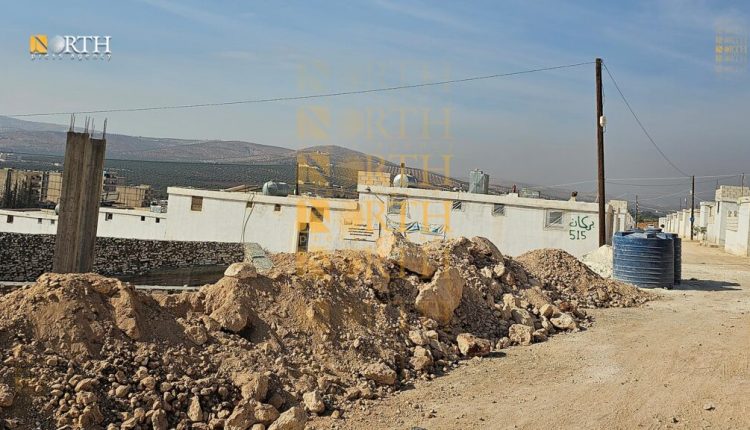
By Avin Youssef
QAMISHLI, Syria (North Press) – Human rights activists in northeastern Syria are deeply concerned about Turkey’s demographic change policy in northern Syria, emphasizing the need to address it promptly to prevent grave consequences of undermining coexistence and civil peace in those areas.
Since Turkey and its affiliated armed opposition factions, aka the Syrian National Army (SNA), took control of various areas in northern Syria, including Sere Kaniye (Ras al-Ain) in northeastern Syria and Tel Abyad in northern Syria, they have implemented a demographic change policy in these regions.
Turkey and SNA factions have repeatedly evacuated original inhabitants from the areas they occupied – such as Sere Kaniye, Tel Abyad, and Afrin – and replaced them with IDPs who fled from different Syrian regions during the war.
Aziddin Saleh, Executive Director of Synergy/Hevdesti Association, a victims’ advocacy group operating in northeast Syria, believes that if the demographic change in northern Syria, particularly in Afrin, Sere Kaniye, and Tel Abyad, is not addressed, it will have serious consequences undermining the coexistence and civil peace that once characterized those areas.
Internal conflicts
Salah, in an interview with North Press, underscores that the forced displacement of original inhabitants from their communities and the resettlement of Syrian IDPs, as well as Syrian refugees from Turkey, into the homes of the original inhabitants, “could potentially trigger internal conflicts among Syrian communities.”
He noted that the “construction of settlements in occupied areas contributes to bringing about demographic change in these areas.”
Bassam al-Ahmad, Executive Director of the Syrians for Truth and Justice organization, an independent NGO working on documenting human rights violations in Syria, believed that coexistence is no more than something from the past. “The individuals whose homes and lands were confiscated and given to families of SNA factions will not give up their rights, and they will not embrace the idea of coexistence because their properties were forcefully taken away from them.”
“Such practices and violations against forcibly displaced IDPs have inflicted significant harm upon coexistence, cultural diversity, and the religious and ethnic fabric,” stated al-Ahmad. He specifically highlighted the repercussions resulting from the resettlement of individuals from different religious backgrounds in the residences of Yazidis in Afrin.
Synergy Association documented the establishment of over 30 settlements in Afrin, with the majority of them being constructed on lands owned by Syrian Kurds who were displaced after the Turkish military operation in Afrin in 2018.
Sere Kaniye lost its diversity
Saleh noted that Sere Kaniye and Tel Abyad, which were characterized by their cultural, religious, and ethnic diversity, housed various communities and sects living in coexistence and civil peace.
“Those areas lost their diversity after the Turkish invasion (Peace Spring Operation) in October 2019, which undermined peace in that region,” Saleh said.
More than 162,000 people from different religions, including Muslims, Christians, Yazidis, as well as from diverse ethnicities – including Kurds, Arabs, Assyrians, Chechens, Assyrians, Circassians, Armenians, Turkmen – lived in Sere Kaniye and its countryside. Over 140,000 people, or more than 85 percent of the indigenous population, were forcibly displaced.
He noted that currently, only 45 out of 75,000 Kurds have remained, while all that remained of non-Muslim people (Yazidis and Christians) are 10 individuals.
More than 2,000 families of internally displaced Syrians and Syrian refugees in Turkey were resettled in the homes of original inhabitants, killing the region’s diversity, according to Saleh.
Bassam Al-Ahmad pointed out that Turkey uses different methods in northern Syria as part of broader strategies to reduce or eliminate the significant Kurdish presence in those regions.
According to al-Ahmad, Turkey is making efforts to undermine the Kurdish presence by confining it to only being represented by the Kurdish National Council in the Syrian opposition. This strategy aims to weaken the Kurdish component in the opposition and render it unable to influence any decisions regarding the region.
He pointed out the recent targeting of infrastructure and service facilities in predominantly Kurdish areas, emphasizing that these are tactics aligned with the strategy of ethnic cleansing against the Kurdish people.
Human rights advocate Zaki Haji from Sere Kaniye stressed that the collective and forced displacement in that area has led to a demographic change in the region.
He said that there are currently only four Yazidis remaining in the region, despite there being 11 Yazidi villages in the vicinity of Sere Kaniye.
According to Haji, the act of forcibly displacing residents and replacing them with Iraqis and families of the SNA from different regions is a violation of international laws, norms, and humanitarian principles.
Turkey is an occupying power
Al-Ahmad highlighted the crucial importance of noting that Turkish presence in Syrian regions constitutes an occupation. Independent international organizations such as Amnesty International and Human Rights Watch have acknowledged that.
Al-Ahmad underscored that Turkey is implementing a multifaceted plan with strategic goals. He emphasized the significance of using terms such as ethnic cleansing, forced displacement, occupation, and systematic human rights violations when discussing the Turkish plans in the occupied areas.
Cultural genocide in occupied areas
“Turkey is executing a cultural genocide in the regions it controls, where Kurdish or Syriac languages and others are no longer present, replaced by the Turkish language,” Haji said.
“There were dozens of schools and thousands of students studying in their native language, but now there are no such schools in the city or the surrounding villages due to forced displacement, leading to changes in culture, societal customs, and traditions,” Haji added.
“The Turkish flag is raised, and the Turkish culture and language are taught in schools. The Turkish currency is used, and the city has become administratively affiliated with the Turkish province of Urfa whose governor visits the city periodically as a deputy and supervisor of the region.”
